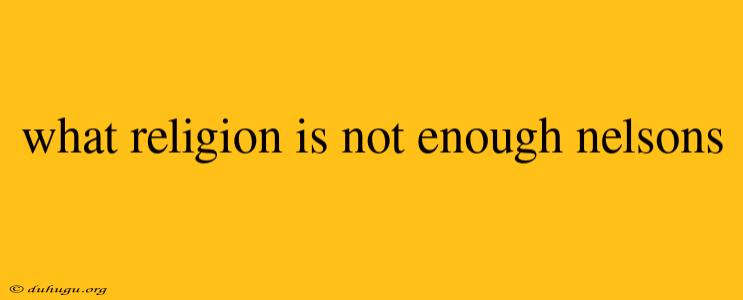What Religion Is Not Enough: Nelson's Perspective
Nelson Mandela, the former President of South Africa and anti-apartheid activist, was a complex figure with a multifaceted persona. While he was known for his strong leadership and fight against racial segregation, he also had a nuanced view of religion. In his autobiography, "Long Walk to Freedom," Mandela shared his thoughts on the limitations of religion in bringing about social change.
Religion as a Tool for Oppression
Mandela believed that religion could be used as a tool for oppression, perpetuating systems of inequality and subjugation. He saw how religious institutions often aligned themselves with the ruling elite, promoting a status quo that maintained social hierarchies. In his own experience, Mandela noted how the Dutch Reformed Church in South Africa supported the apartheid regime, using scripture to justify segregation and discrimination.
The Limits of Religious Morality
Mandela also argued that religion, on its own, was not enough to bring about meaningful social change. He believed that religious morality, while important, was insufficient to challenge the entrenched power structures that perpetuated inequality. In his view, religion could provide a sense of personal morality, but it often failed to address the systemic issues that perpetuated social injustice.
The Need for Collective Action
Instead, Mandela emphasized the importance of collective action and political mobilization to bring about meaningful change. He believed that individuals, regardless of their religious beliefs, needed to work together to challenge unjust systems and push for reform. This required a commitment to social justice, rather than simply relying on religious convictions.
A Call to Action
Mandela's perspective on religion serves as a call to action for individuals to engage in social activism, rather than solely relying on faith to bring about change. He encourages us to move beyond individual piety and moralism, and instead, work towards creating a more just and equitable society.
Conclusion
Nelson Mandela's views on religion highlight the limitations of faith in bringing about social change. While religion can provide personal morality and comfort, it is insufficient to challenge systemic inequality. Instead, Mandela's perspective emphasizes the need for collective action, political mobilization, and a commitment to social justice to create a more equitable world.
